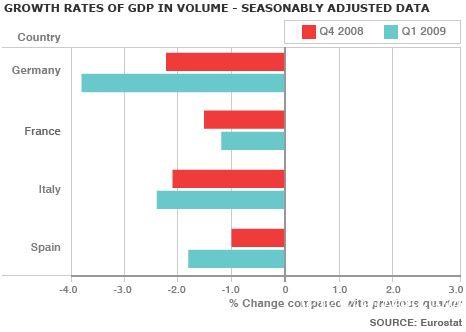| ||||||||||||||||||||||||||||||||||||||||||||||||||||||||||||||||||||||||
|
The economies of the 16 countries that make up the eurozone declined by 2.5% in the first three months of 2009, the EU's statistics agency Eurostat said. 欧盟统计局称,2009年第一季度,由16国组成的欧洲联盟经济下滑2.5个百分点。 German exports declined at a faster rate than imports Analysts1 had forecast a drop of only 2%. A sharp fall in German exports was a key factor in the decline. The German economy suffered its largest contraction2 since reunification(重新统一), falling 3.8% in the first quarter. Eurostat also said that consumer price inflation in the eurozone remained steady at 0.6% in April. GDP in the eurozone fell 4.6% on a year-on-year basis. GDP measures the value of all goods and services produced in a country. GDP also fell 2.5% in the wider EU. About 60% of the UK's exports go to the 27 countries in the EU. 'Uncertainty3 shock' The record decline in German GDP was led by falls in exports and investments, the Statistics Office said. Year-on-year the German economy shrank by 6.7%. The German government has predicted the economy will shrink 6% in 2009. That is a more downbeat forecast than the European Commission's. The Commission expects Germany, Europe's biggest economy, to contract 5.4% this year. It predicts a contraction of 4% across the eurozone. The severity(严格,严重) of the contraction surprised economists4. "The figures came in a bit worse than even we had expected and are significantly worse than the consensus(一致,合意)," said Joerg Kraemer from Commerzbank. "In the first quarter, the German economy fell victim to the 'uncertainty shock', which has gripped the world economy since the collapse5 of Lehman Brothers." The fourth quarter of 2008 had previously6 been the worst on record, with GDP falling by a revised 2.2%. On Thursday, Finance Minister Peer Steinbrueck admitted the German government would announce record budget deficits8 for 2009 and 2010. Mr Steinbrueck said the deficit - the difference between a government's spending and tax take - would exceed 50bn euros (£45bn) this year and rise to 90bn euros next year. The current record is 40bn euros set in 1996. Germany unveiled a 50bn euro economic stimulus9 package in January and has spent heavily on bank bail-outs. Mr Steinbrueck's forecasts mean that Germany is likely to miss the EU's target for eurozone countries to restrict their deficits to within 3% of their GDP. 点击  收听单词发音 收听单词发音
|
||||||||||||||||||||||||||||||||||||||||||||||||||||||||||||||||||||||||
- 发表评论
-
- 最新评论 进入详细评论页>>





